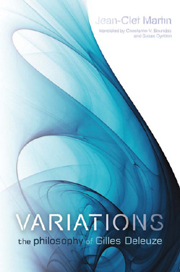Book contents
- Frontmatter
- Contents
- Letter-Preface by Gilles Deleuze
- Preambles
- First Variation: Ethics and Aesthetics
- Second Variation: Three Poetic Formulas for Nomadic Distribution
- 1 Time Out of Joint
- 2 The Dice Throw
- 3 ‘The Garden of Forking Paths’
- Third Variation: Multiplicities
- Fourth Variation: Malcolm Lowry, or, the Manifesto of Things
- Postscript to the Anglo-American Edition: What is a Multiplicity?
- Notes
- Bibliography
- Index
1 - Time Out of Joint
from Second Variation: Three Poetic Formulas for Nomadic Distribution
Published online by Cambridge University Press: 12 September 2012
- Frontmatter
- Contents
- Letter-Preface by Gilles Deleuze
- Preambles
- First Variation: Ethics and Aesthetics
- Second Variation: Three Poetic Formulas for Nomadic Distribution
- 1 Time Out of Joint
- 2 The Dice Throw
- 3 ‘The Garden of Forking Paths’
- Third Variation: Multiplicities
- Fourth Variation: Malcolm Lowry, or, the Manifesto of Things
- Postscript to the Anglo-American Edition: What is a Multiplicity?
- Notes
- Bibliography
- Index
Summary
The channels of the Kantian metaphorics – from the island to the tower, from the tower to the mole, from the mole to the nomad and from the nomad to the arena of gladiators – form an entire allegory that mobilizes a process of dramatization, the central knot of which tightens around the figure of the heavy cinnabar. A wall of silence runs parallel to the development of concepts in this allegory, the weft of which spins out its play of continued metaphors in all directions. In the last analysis, the continued metaphor of the allegory allows us to dramatize the means to escape the alarming alternative proposed by the cinnabar's hypothesis. What we want to say and what Deleuze's philosophy conveys is that there are two critiques in one – at least two critiques – with Kant on one side, seduced by the power of images and of thought restored to its image and, on the other side, the Kant that Deleuze poetizes with the help of four formulas that produce another arrangement of concepts. We could say that the Kantian allegory is a question of juxtaposing four problematic points – four poetic formulas that draw in all the power of the outside and graft the conceptual chain of the three critiques onto Shakespeare, Rimbaud and Kafka (Deleuze 1984: vii–xiii).
The notion of formula often returns inside Deleuze's texts. The formula is not the metaphor: it is the statement by which a text develops a subterranean lineage with other texts – a series of lineages that reformulate concepts.
- Type
- Chapter
- Information
- VariationsThe Philosophy of Gilles Deleuze, pp. 57 - 78Publisher: Edinburgh University PressPrint publication year: 2010



